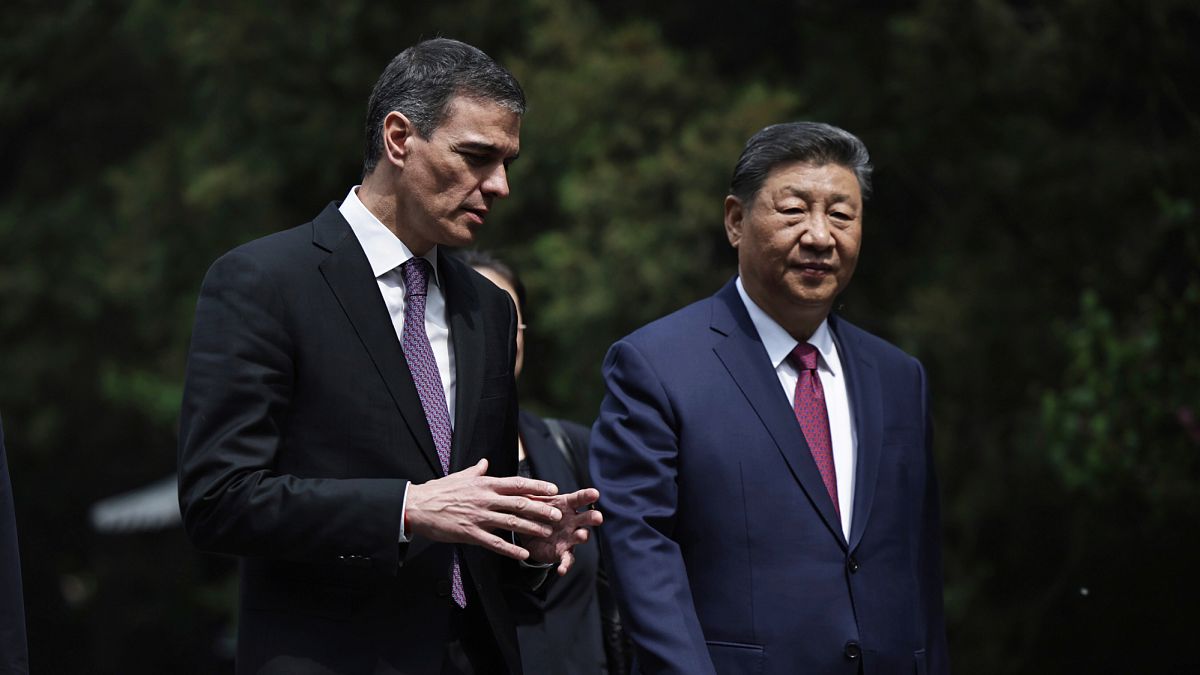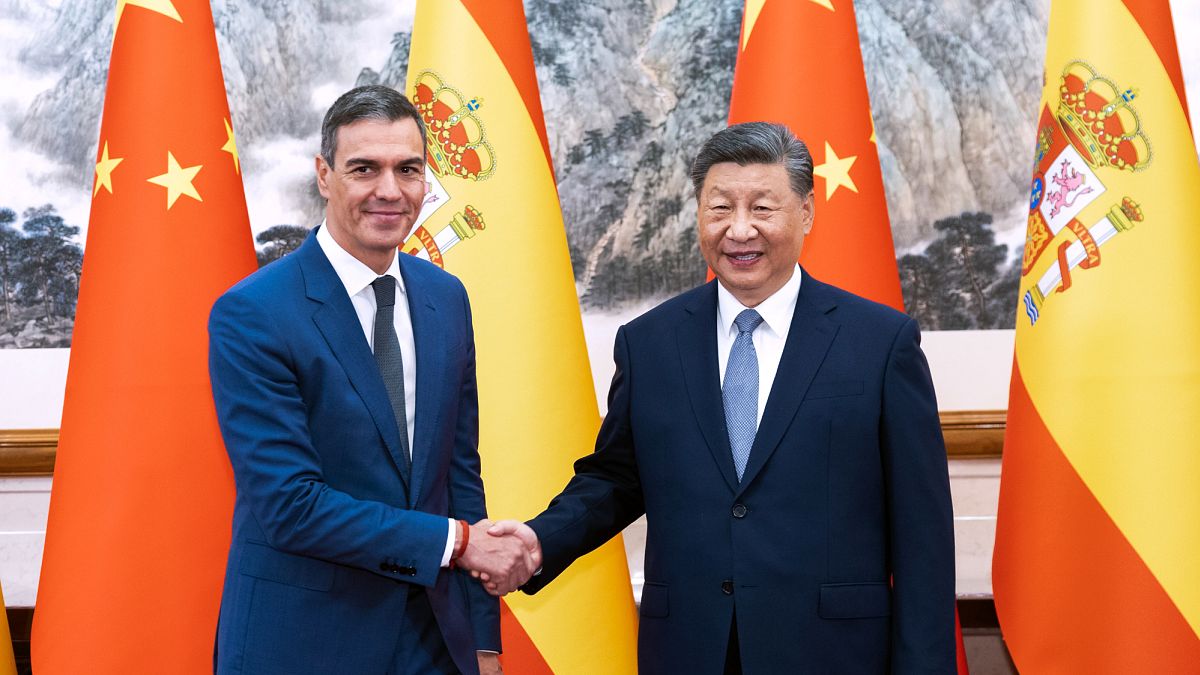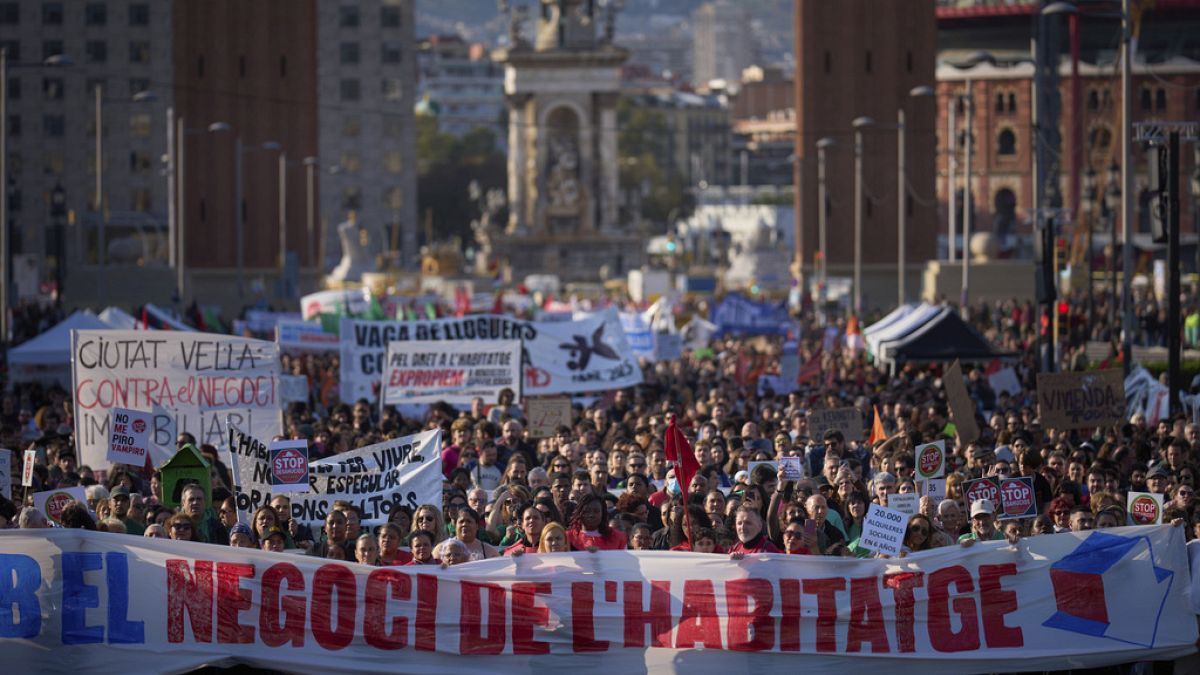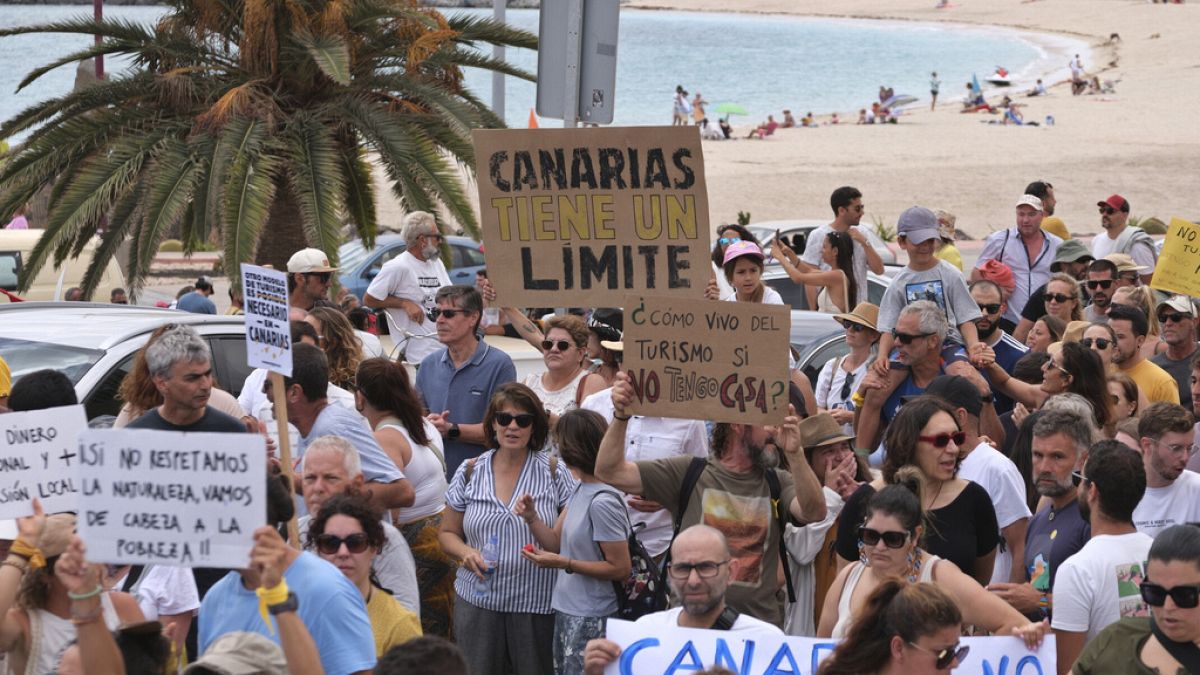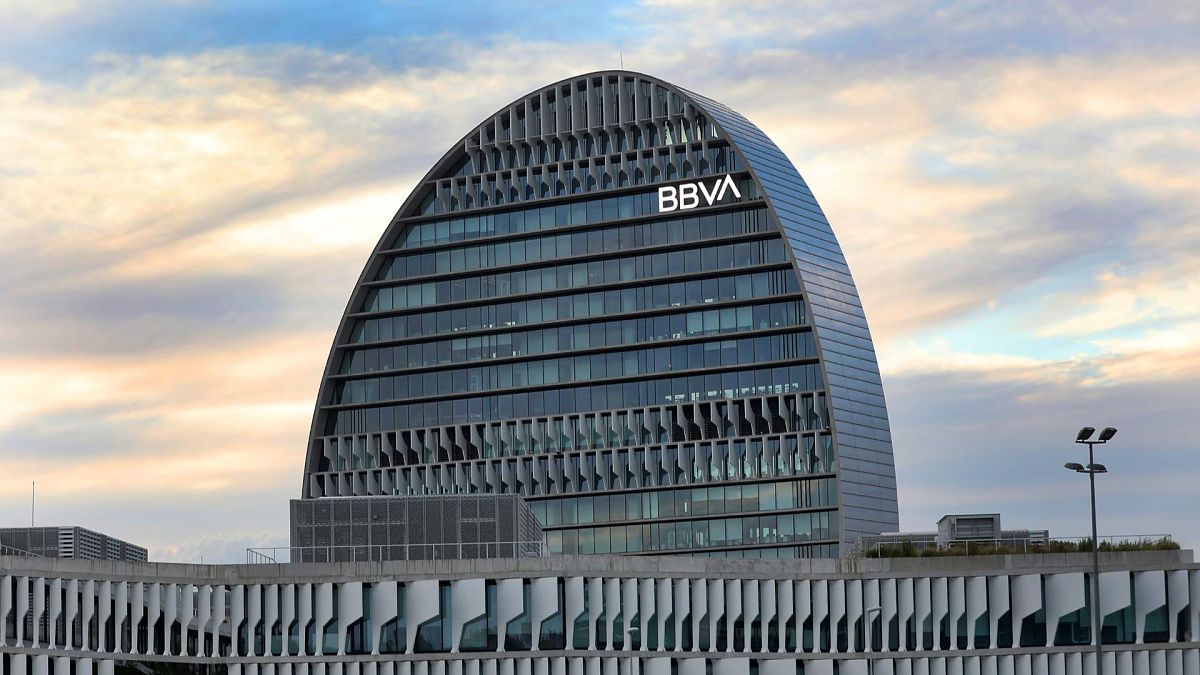Publicly-owned supermarkets? Left-wing party sparks debate in Spain
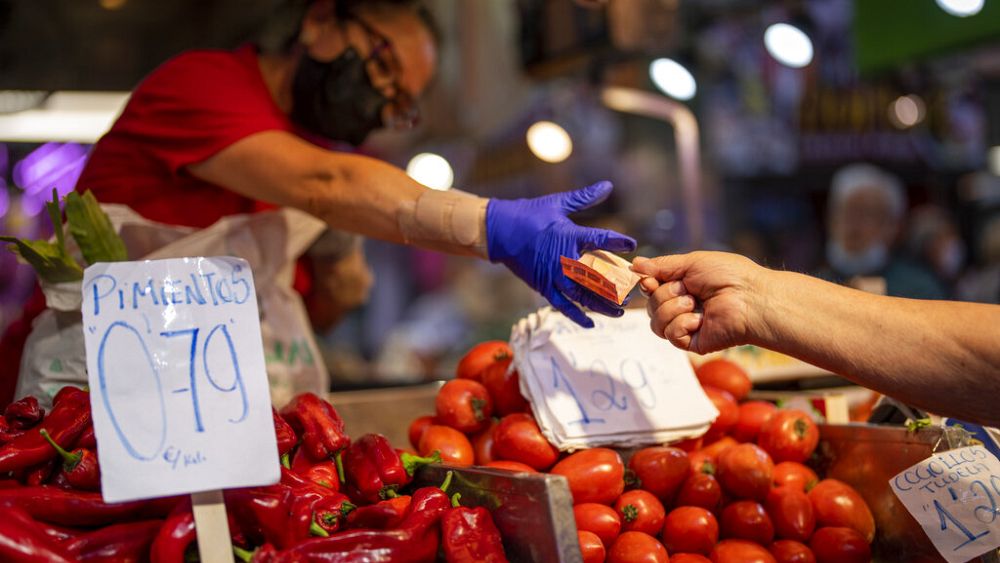
Food prices in Spain will remain very high throughout the remainder of the year, experts have warned, as Podemos launches an initiative to open publicly-owned grocery stores.
A Spanish political party is offer food for thought to households across the country, with a plan to launch a chain of publicly-owned supermarkets to control the price of groceries.
Podemos, a minority left-wing party in the Socialist government coalition hopes the idea will catch on, after it sparked a lively debate.
“It’s an ambitious idea, but we believe will be very useful in the long term”, María Teresa Pérez, Podemos’ Institutional Action Secretary, told Euronews.
Soaring food prices hit a record high in February, increasing 16.6% compared to the same month last year.
And prices haven’t fallen much since then, despite a reduction in VAT on some basic food products introduced by the Spanish government.
So Podemos wants to take a step further, but Spaniards are divided over the proposal.
“Every time I do my groceries, I pay more and more” says Enrique, a literature teacher in Valencia. Many, like him, are now opting for basic and white label products and “no longer buy fish and meat if it’s not on offer”.
When asked about Podemos’s idea, Enrique says he is torn.
He desperately seeks a reduction of food prices, and hopes the proposal will achieve it, but he is still uncertain about how it will come to life.
“I have my doubts. I think regulating the production chain and ensuring that companies do not abuse profits would be better”, he says.
Javier Ortega, an economist from Madrid, told Euronews he is concerned that this proposal will end up impacting Spaniards’ wallets.
“It is true that it would end up reducing prices in supermarkets, but it is always the taxpayers who end up paying more to compensate for the losses generated by public companies”, he says.
“It doesn’t make sense to reduce the price of the shopping basket and then increase our taxes because the public supermarket chain loses money in spurts”, he adds.
What exactly is Podemos proposing?
The left-wing party refutes these arguments and keeps advocating for the creation of public supermarkets.
“In Spain, the food sector has increased prices in an abusive way. This cannot be justified by inflation alone”, says Podemos’s María Teresa Pérez.
“Many families have to buy poorer quality food because the prices of what they would like to buy are too high. Prices have risen by around 30%, twice as much as the consumer price index for food”, she adds.
‘Precios Justos’, which translates literally as ‘Fair Prices’, will be the name of the state-owned company.
According to Pérez, it would start with a phased plan. The idea is to open the first 1,000 shops in municipalities with more than 20,000 inhabitants.
“We want to reach every family, regardless of their income and residence”, she explains.
Podemos aims to lower the price of products, while paying more producers and offering decent working conditions to employees.
The party blames private supermarkets for “speculating” with the price of food and “having a greedy behaviour, which is not surprising, but outrageous”.
The big question is, should it succeed, how much public money will be invested in this new measure?
“The economic effort will obviously have to come out of the public budget, but we don’t have the calculation worked out yet”, says Pérez.
Although the party still has to develop the technical idea further, Podemos’s spokesperson says the expense “does not necessarily have to be passed on to taxpayers”.
According to the party’s calculations, there will be more benefits than costs, as up to 50,000 new jobs would be created. The plan would also help small businesses through an alliance whereby the state-owned chain would act as a distributor for them.
“Market intervention is a way of ensuring the general interest is put before economic profit”, she says.
Is it feasible?
While Podemos is championing the notion of government-funded supermarked, Spain’s distribution chains have flatly rejected the idea.
The main association of manufacturers and distributors considers it “out of touch with reality”, “post-truth”, and would “contribute nothing”.
They also lamented that Podemos’s secretary general, Ione Belarra, had labelled food distribution bosses as “capos”.
The left-wing party is openly at war against main private supermarket chains. “Only four companies hold 40% of the entire market share, Mercadona, which is the largest company, has 25%”, Pérez points out.
Economist Raymond Torres, head of the Funcas analysis centre, argues that the best way to achieve what Podemos is looking for is through competition.
“It is the main instrument to ensure affordable prices for consumers and sufficient prices for farmers. It is true that it could be achieved through a public network of supermarkets, but I question whether it is necessary. I think it is much better to modify the conditions of competition”, he says.
Torres also adds that generally, rising costs are passed on very quickly to prices, but conversely, the decline is always much slower.
Where does this idea come from?
There has been much debate about the novelty of the idea. Some experts suggest that the proposal is inspired by Hugo Chávez’s star measure in Venezuela, a supermarket chain led by the Ministry of Popular Power for Agriculture. An idea which ended up failing eight years later.
In Europe, Spain is not the first country to ponder this option. Poland considered it three years ago when the government proposed creating a state-owned grocery chain to help farmers.
“We want to be present where we are able to ensure profitability of production for the farmers in the long term”, Artur Sobon, deputy minister of state assets in Poland told Money.pl.
Romania also announced a plan to reintroduce a state-owned retail chain called Unirea (The Union) three decades after the collapse of communist rule.
Just before the COVID pandemic, the Ministry of Agriculture announced the creation of an “agro food commerce”, a state-owned company that would support small farmers in Romania and promote national products.
The company invites small farmers to sell their vegetables through public grocery stores.
The measure was halted due to the pandemic and the agriculture ministry has asked for time to implement it.
Source: Euro News


